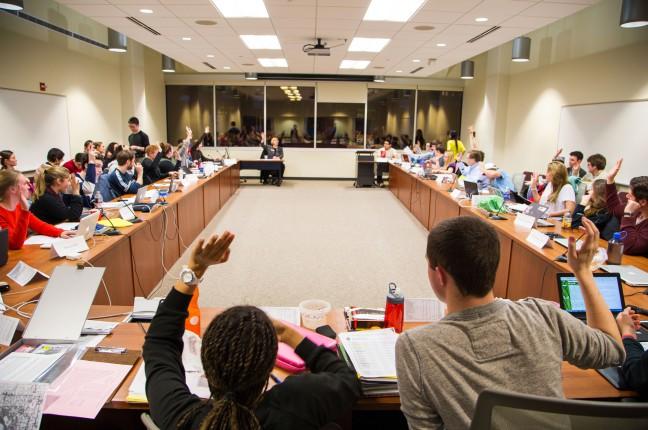University of Wisconsin’s student government passed a resolution Wednesday recommending the university pay a living wage for all student employees to send a message to administration.
The legislation, which ASM passed 15-1-3, serves as a recommendation to university administration to increase all student worker pay despite some ASM representatives’ concerns that it comes at an inconvenient time of budget cuts.
Nominations Board Chair Megan Phillips, the sponsor of the legislation, said student wage increases are long overdue.
“A lot of people on campus have been discussing how to make college more affordable through not-so-traditional methods, and I think raising wages is a good way to achieve that,” Phillips said.
The tenets of the legislation outlined the idea that for a student to pay for the cost of tuition, an individual would have to work 15 hours a week making $21 per hour.
The minimum wage is currently set at $8.50 at the Wisconsin Union and $7.25 for all other campus entities. According to the legislation, ASM members argued the recommendation to increase all student wages will be a step toward affordability and accessibility for all students.
Instead of listing a specific recommended wage, Phillips said she simply recommended a living wage to help spark a discussion across campus.
Phillips said even though the university will most likely not heed the recommendation this semester, she hopes it will urge parties across campus to continue having the conversation about student wages.
“It’s on us to fight for affordability and accessibility,” said Finance Committee Chair Madison Laning. “We can tell the university that this needs to become a priority and that this is something for which they need to move their budgets around.”
In a statement responding to the proposed legislation, Vice Chancellor for Finance and Administration Darrell Bazzell said while the university appreciates ASM’s interest in paying all student workers a living wage, in the face of budget cuts, the university must focus on its current efforts of raising wages for classified staff.
With the implementation of its new personnel system July 1, the university will raise wages for classified staff to meet the living wage of $12.45 an hour currently set for the city of Madison.
“Extending the living wage to student hourly employees would carry additional costs in the range of $12 million to $13 million,” Bazzell said. “Because many of these wages are paid with funding from student fees, we would need a thorough discussion with students about potential implications for programs and services.”
While nearly all ASM representatives agreed raising student wages ought to be a priority, some members echoed concerns the recommendation was not practical given the fact student segregated fees would need to increase $10 per student per semester for the next four years to fund the higher wages.
However, representatives including Jessica Franco-Morales argued funding for wage increases could come from other sources beside student segregated fees.
Some solutions members suggested included redirecting funding allocated for campus construction projects and new staff at the Wisconsin Union. Some even showed interest in reducing the pay of certain members of university administration.
However, representatives such as Student Service Finance Committee Chair Devon Maier called for restraint, arguing that such reallocation is not within the jurisdiction of ASM.
“I’m all for steady wage increases, but we have to be pragmatic,” Maier said. “We have to realize that unless we have full control over our segregated fees, we’re not going to have the opportunity to redirect funds from totally separate budgets coming from donors.”

















